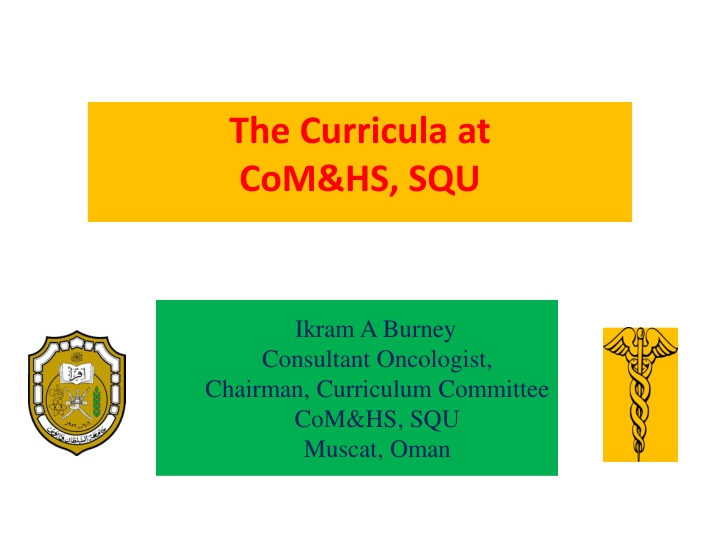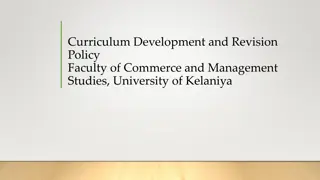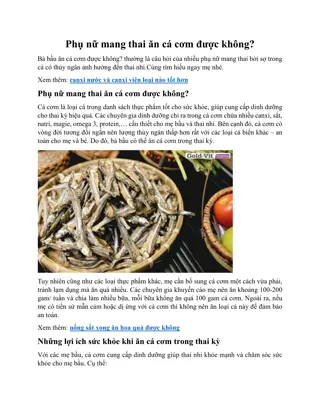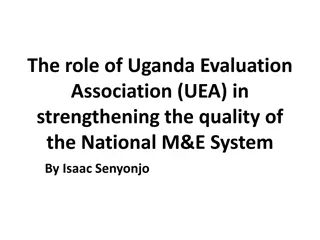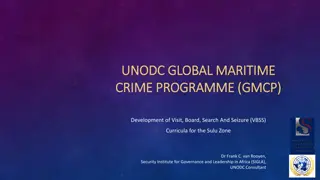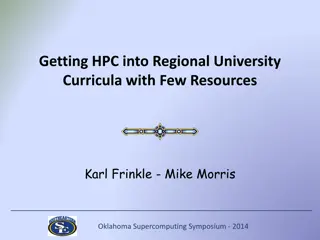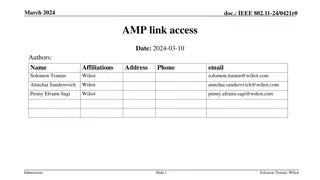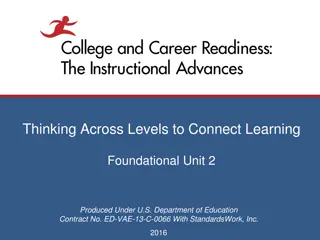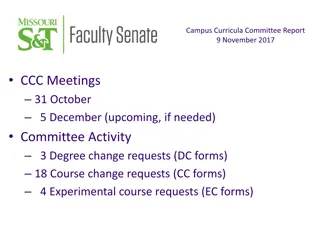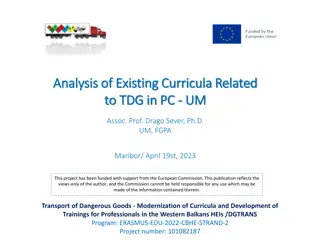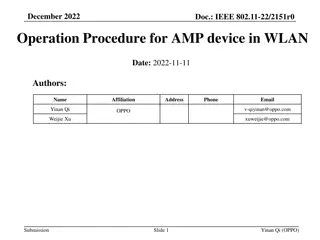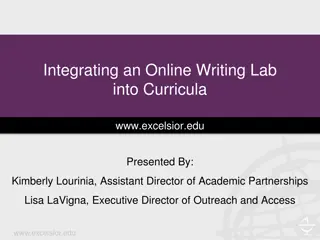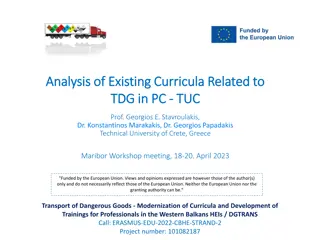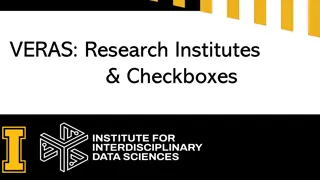The Curricula at CoM&HS, SQU: Overview and Objectives
In this presentation, Dr. Ikram A. Burney discusses the MD curriculum at CoM&HS, SQU in Oman, focusing on the phases, outcomes, history, and integration. The curriculum aims to produce well-rounded physicians equipped to meet the demands of modern medical practice. Key elements include outcome-based learning, early clinical exposure, and professionalism. The talk delves into the educational structure, teaching methodologies, and assessment strategies designed to nurture competent and ethical medical professionals.
Download Presentation

Please find below an Image/Link to download the presentation.
The content on the website is provided AS IS for your information and personal use only. It may not be sold, licensed, or shared on other websites without obtaining consent from the author.If you encounter any issues during the download, it is possible that the publisher has removed the file from their server.
You are allowed to download the files provided on this website for personal or commercial use, subject to the condition that they are used lawfully. All files are the property of their respective owners.
The content on the website is provided AS IS for your information and personal use only. It may not be sold, licensed, or shared on other websites without obtaining consent from the author.
E N D
Presentation Transcript
The Curricula at CoM&HS, SQU Ikram A Burney Consultant Oncologist, Chairman, Curriculum Committee CoM&HS, SQU Muscat, Oman
This talk is about . MD BMS Phase I Phase I Phase I Semesters x 8 Phase II Phase II Phase II Internship Phase II Intercalated Phase Intercalated phase Phase III MD BScHS and MD BScHS BSc in BMS Teaching Learning Assessment April 7, 2016 Orientation to Curriculum 2
Agenda Background Basis of the MD Curriculum Overview of MD Program Administration April 7, 2016 Orientation to Curriculum 3
MD Curriculum To produce undifferentiated physicians who are prepared to serve the fundamental purposes of medicine and satisfy the contemporary requirements of medical practice and professionalism April 7, 2016 Orientation to Curriculum 4
History 2006 College Board 2007 Academic Council 2007 University Council 2008 Implemented 2013Accreditation 2014 1st Batch Graduated April 7, 2016 Orientation to Curriculum 5
Basics of the curriculum Outcome-based Integration Presentation-based Relevance Early Clinical Exposure April 7, 2016 Orientation to Curriculum 6
Outcomes The doctor as a Scholar & Scientist Biomedical scientific principles Psychological & social principles Scientific methods & approaches to medical research The doctor as a practitioner Consultation with a patient Diagnose and manage clinical presentations Communicate effectively with patients and colleagues Provide care of medical emergencies Prescribe safely, effectively and economically Practical procedures safely and effectively Use information effectively in medical context The doctor as a professional Behave according to ethical and legal principles Reflect, learn and teach others Work within a multi-professional team Protect patients and improve care April 7, 2016 Orientation to Curriculum 7
Integration (Presentation-based) Anatomy Surgery Anatomy Physiology Biochemistry Pathology Medicine Physiology Vertical Horizontal April 7, 2016 Orientation to Curriculum 8
Integration Organ-systems Respiratory module surfactant Review of anatomy embryology Drug treatment of asthma Lung tumours U and L RTI Partial pressure of gases Lung volumes COAD April 7, 2016 Orientation to Curriculum 9
Relevance (Early Clinical Exposure) Integrated module Wrap-up presentation Case discussion Hospital session Skills Lab session Tutor-led Brainstorming Paper case of the week April 7, 2016 Orientation to Curriculum 10
Vertical Integration Medical Ethics & Communication Lectures Cases / Tutorials / Seminars Medical Ethics 1 Ethics in Research Core professional and communication skills Confidentiality Autonomy Informed Consent Sem 2 Communication via an interpreter Cultural and regional aspects of communication Breaking Bad News Truth Telling Power of Attorney Organ Donation & Transplantation Sem 3 Ph II Medical Ethics 2 Communication Skills and difficult patient Beneficence, non-maleficence Dealing with minors DNR Sem4 Beneficence, non-maleficence Autonomy & Justice Moral Obligations of Medical students Protection of Physical and Mental wellbeing Confidentiality / Informed Consent Breaking Bad News Two Workshops Pre- Clerkship Ph III Ethical issues related to Abortion Terminal supportive Care / DNAR Medical Errors and Disclosure JC / SC April 7, 2016 Orientation to Curriculum 11
Another Example Patient Safety Lectures Cases / Tutorials / Seminars Infection Prevention & control Ph II Sem 1 Sem 2 Understanding mistakes and complaints Sem 3 Sem4 Safe Prescribing Patient Safety, human Factors, Learning from Errors Using Quality Management to Improve care Handwashing (including assessment) Ph III Pre- Clerkship Improving Medication Safety Medical Errors and Disclosure JC / SC April 7, 2016 Orientation to Curriculum 12
What is a Presentation ? 1. 2. 3. 4. 5. 6. 7. 8. 9. 10. GI Bleed 11. Hemiplegia 12. Hempotysis Abdominal distention Breathlessness / Dyspnoea Chest pain. Delirium / confusion Diabetes mellitus Dizziness Edema Electrolyte abnormalities Fever. 13. Hypoxia / Cyanosis. 14. Hepatomegaly 15. Jaundice 16. Murmur 17. Palpitation 18. Proteinurea 19. Renal failure (Acute) 20. Renal faliure (Chronic) 21. Splenomegaly 22. Weakness / Paraplegia 23. Wheezing April 7, 2016 Orientation to Curriculum 13
Graded Clinical Responsibilities (IM 1,2,3) See How to do it (Pre-Clerkship) Learn How to do it (10/52) (JC) Do / Learn Under Supervision (SC) Do / Learn Under Supervision (PI) Work under supervision 14 April 7, 2016 Orientation to Curriculum
Overall program Semester 1 Semester 2 Phase I fGPA = or > 2.5 Semester 1 Semester 2 Semester 3 Phase II Semester 4 cGPA = or >2.5 cGPA < 2.5 Pre-clerkship Semester 1 Junior Clerkship Phase III Semester 2 Senior Clerkship Pre-Internship MD BScHS April 7, 2016 Orientation to Curriculum 15
Phase I 34 credits 2 or 3 semesters Basics of Medicine University Electives College Courses Progression to Phase II - Focused GPA = or > 2.5 April 7, 2016 Orientation to Curriculum 16
Phase II 69 credits 4 semesters Basics of Science Organ-systems x 8 Clinical Nutrition Integrated Module x 3 (Early clinical Exposure) Research Module (Student Project) Progression to Phase III cGPA = or > 2.5 April 7, 2016 Orientation to Curriculum 17
Intercalated Phase (31 credits) cGPA < 2.5 cGPA = or > 2.5 Courses Practicums BScHS Courses Research Project BScHS Back to Phase III April 7, 2016 Orientation to Curriculum 18
Phase III Pre-clerkship 9/57 H&P + Analysis of data Junior Clerkship 48/57 Senior Clerkship 48/60 Attachment to CTUs + Seminars + Bedside + PCM + On-call Pre-Internship 12/60 CTU + On-call April 7, 2016 Orientation to Curriculum 19
Phase III Major rotations (Medicine, Surgery, CH, ObGyn, BM, FAMCO) Special Rotations (A&E, Orthopedics, ENT, Ophthalmology, Hematology, Radiology, Dermatology, Oral health, Genetics, Anesthesia, ICU) SLTs (Skills lab, Geriatrics, forensic Med, EBM, Therapeutics, Laboratory Medicine) Elective 8/60 Selective 2/60 April 7, 2016 Orientation to Curriculum 20
Curriculum Administration Curriculum Committee Advisory committee to CB Management Group day to day work Chairman Chair of CEC Phase coordinators (I, II, III, IC, BMS) Assistant Deans (Pre-clinical and Clinical) In-Charge Curriculum Office Departments co-ordinators April 7, 2016 Orientation to Curriculum 21
